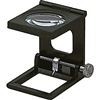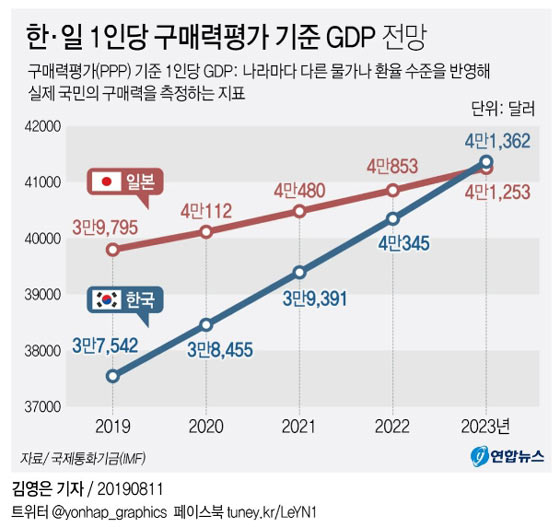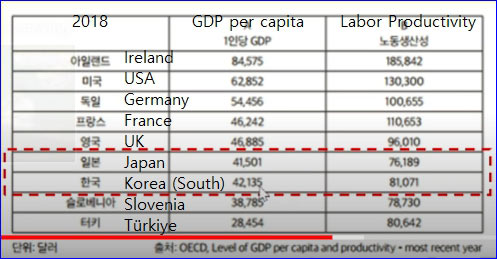
Korea's per capita GDP in 1965 was US$124,
which was 1/7 of Japan (850), 1/14 of the UK(1,770), and 1/30 of USA(3,618).
In 1984, Korea's per capita GDP was US$2,366,
which was 1/4.6 of Japan (10,919), 1/3.4 of the UK (8,239), 1/7.15 of the USA(16,937),
In 1996, Korea's per capita GDP was 12,996,
which was 1/3 of Japan(39,322), 1/1.85 of the UK(24,119), and 1/2.28 of USA(29,742).
In 2007, Korea's per capita GDP was US$22,815 dollars,
which was 1/1.54(64%) of Japan(35,293), 1/2.18 (45%) of the UK(49,893), and 1/2 (50%) of USA(47,786).
In 2018, Korea's per capita GDP was US$31,363,
which was 80% of Japan(39,290), 73% of UK(42,944), and 1/2 (50%) of US(62,795).
(Sejong = Yonhap News) Correspondent Lee Dae-hee = By 2023, South Korea's per capita GDP based on Purchasing Power Parity (PPP) is expected to surpass Japan's.

[
According to the World Economic Outlook database data of the International Monetary Fund (IMF) as of the 11th, Korea's per capita GDP based on PPP this year was $37,542, ranking 32nd out of 194 countries surveyed.
GDP per capita based on PPP is an indicator that measures the actual purchasing power of the people by reflecting different prices and exchange rate levels in each country.
Assuming that you buy things with the same dollar, the amount you can buy in Europe, where prices are expensive, and Africa, where prices are cheap, are different. PPP eliminates these differences to show the actual standard of living.
Japan's GDP per capita based on PPP this year was $39,795, ranking 31st. It is $2,253 more than Korea, and the ranking is one notch higher.
The IMF predicted that the rankings would be reversed in four years as the gap between Korea and Japan gradually narrows.
The IMF predicted that GDP per capita based on PPP in 2023 would be $41,362 in Korea and $41,253 in Japan. It is expected that Korea will reverse Japan by 109 dollars.
It is the first time since 1980 that the IMF holds related statistics for Korea to outperform Japan.
In 1980, Korea was $5,084 and Japan was $20,769, more than four times the gap, but it is said that it will reverse after a long chase.
From 2019 to 2023, the IMF predicted that Korea would grow by 10.2% based on PPP, but Japan would only grow by 3.7%.
"The IMF's forecast is that the real standard of living will reverse in 2023," said Kim Jung-sik, a professor at Yonsei University's Department of Economics.
Korea's GDP per capita based on PPP will reverse Japan's in 2023, but the IMF expects the gap in nominal GDP per capita to widen somewhat.
According to the IMF forecast, Korea's nominal GDP per capita this year is $31,937, ranking 31st in the world. Japan is 25th with $41,021.
In 2023, Korea's nominal GDP per capita is expected to rise 20.9% from this year to $38,612, ranking 28th in the world, up three notches.
During the same period, Japan was expected to grow by 27.1% to hit $52,140. It is expected to rise 4 places to 21st.
The gap in overall economic size, which has been steadily narrowing, is also expected to widen slightly.
Korea's nominal GDP is projected to be $1.657 trillion this year. Japan is projected to grow 3.1 times to $5.176 trillion.
In 1980, South Korea was $65 billion and Japan was $1.15 trillion, a 17.0-fold difference, but Korea grew at a faster rate, steadily decreasing to 10.8 times in 1994 and 5.3 times in 2005.
The IMF predicted that the multiplier would slightly increase to 3.2 times in 2023 after recording a minimum of 3.1 times last year.
Nominal GDP is a measure that does not take population into account. As of this year, the population of Japan (about 120 million people) is about twice as large as that of Korea (about 52 million people).
Korea's national credit rating is higher than Japan's by two notches.
Standard & Poor's (S&P) sees Korea's credit rating as 'AA' and Japan as 'A+'. Moody's rates Korea as 'Aa2' and Japan as 'A1' respectively. Fitch rated Korea as 'AA-', but Japan was rated 'A' two notches lower.
[Table] 2019∼
